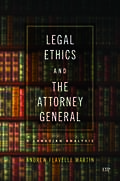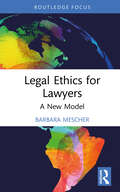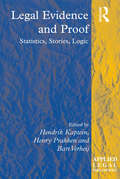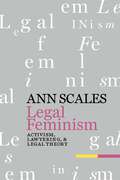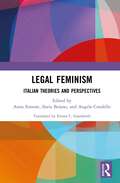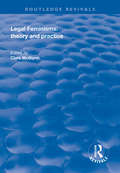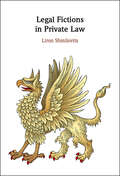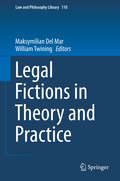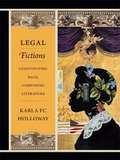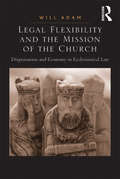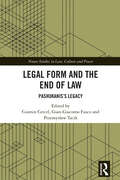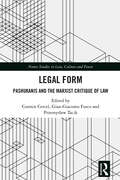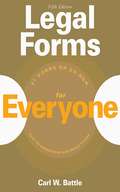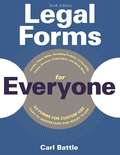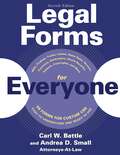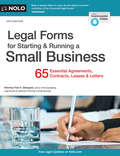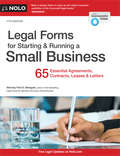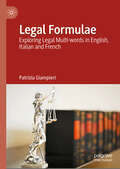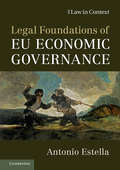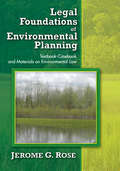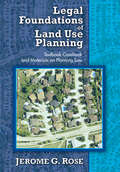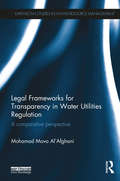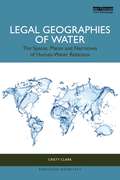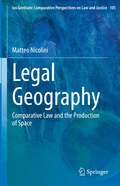- Table View
- List View
Legal Ethics and the Attorney General: A Canadian Analysis
by Andrew Flavelle MartinIn Canada, the Attorney General holds a complex and unique role within the federal, provincial, and territorial governments. Despite this key position, there is relatively little knowledge and understanding of the role and professional responsibilities of the Attorney General among the public, the media, policymakers, and politicians – including at least some Attorney Generals themselves. Legal Ethics and the Attorney General adopts a doctrinal approach to examine and explain how legal ethics, and particularly the law of lawyering, applies to the Attorney General. The book illustrates that, while the role of the Attorney General is unique, the individual occupying this position practises law and should be held to the same standards as any other lawyer. It addresses common misconceptions: that the Attorney General is not truly a lawyer, that actions deemed wrongful for other lawyers may not be considered wrongful for the Attorney General, or that the accountability measures appropriate for lawyers do not apply to the Attorney General. Ultimately, Legal Ethics and the Attorney General reveals the importance of the accountability of the Attorney General, especially to the provincial and territorial law societies that serve as regulators of the legal profession. This accountability is essential not only for upholding the rule of law but also for enabling these societies to fulfil their statutory mandates to regulate the legal profession in the public interest.
Legal Ethics for Lawyers: A New Model (Routledge Research in Legal Philosophy)
by Barbara MescherThis book proposes a new model of professional ethics enabling lawyers to advise clients upon both the law and ethics. This will better protect clients, and society, and enhance lawyers’ professional obligations. The current model of legal ethics, developed in the 19th century, specified that the role of lawyers was only to interpret the law, not also to give ethical advice. This was acceptable to lawyers, clients, and society at that time. However, this is not the case now and legal ethics no longer reflects the needs of modern legal practice. This book draws on moral philosophy to present a new model of legal ethics that explains the analytical process to include ethical advice. It analyses the potential harm of the present model to the legal profession who have duties to the law and justice that may compete with demands by clients to serve them. Further, lawyers’ duty to clients to act in their best interests is sometimes not adequately fulfilled as legal ethics does not permit lawyers to give ethical advice even if it may be in clients’ best interests to do so. The work includes a detailed case study of corporate law practice to show why a new legal ethics is required. Other case examples are provided to demonstrate that lawyers practicing in all areas of law encounter ethical issues and they too will benefit from a new legal ethics. The book will be essential reading for students, academics, lawyers and professional bodies.
Legal Evidence and Proof: Statistics, Stories, Logic (Applied Legal Philosophy)
by Bart Verheij Hendrik Kaptein Henry PrakkenAs a result of recent scandals concerning evidence and proof in the administration of criminal justice - ranging from innocent people on death row in the United States to misuse of statistics leading to wrongful convictions in The Netherlands and elsewhere - inquiries into the logic of evidence and proof have taken on a new urgency both in an academic and practical sense. This study presents a broad perspective on logic by focusing on inference not just in isolation but as embedded in contexts of procedure and investigation. With special attention being paid to recent developments in Artificial Intelligence and the Law, specifically related to evidentiary reasoning, this book provides clarification of problems of logic and argumentation in relation to evidence and proof. As the vast majority of legal conflicts relate to contested facts, rather than contested law, this volume concerning facts as prime determinants of legal decisions presents an important contribution to the field for both scholars and practitioners.
Legal Feminism: Activism, Lawyering, and Legal Theory
by Ann ScalesIn the late 1970s, feminist scholars and activists joined together to build a movement aimed at bringing feminist theory and experiences to the practice and teaching of American law. Since then, the feminist jurisprudence movement has taken root, with courts and legislatures addressing matters of sex and gender inequality, and law schools employing feminist and post-feminist theory in the classroom. In this important book, Ann Scales, a founding contributor to the movement, reflects on the past, present, and future of feminist jurisprudence.Legal Feminism situates the feminist jurisprudence movement within the larger context of Western law and philosophy, focusing first on common problem areas of legal theory and decision-making, and then explaining how feminist jurisprudence can analyze and address these issues in new ways. Throughout, Scales draws on legal disputes to show how feminist theory works in the courtroom and in other real-life arenas.Part personal memoir, part primer, and part treatise, Legal Feminism is a de-jargonized, lively account of how feminist jurisprudence can solve traditional legal conflicts, and why it matters to anyone committed to building an equitable and progressive society.
Legal Feminism: Italian Theories and Perspectives
by Angela Condello Anna Simone Ilaria Boiano Emma C. GainsforthThe volume offers an overview of the theories and practices of Italian legal feminism, presenting both the main themes addressed and the main protagonists of Italian feminist legal theory. The book is divided into two parts. The first is dedicated to deepening crucial issues that directly concern women’s knowledge and lives from a feminist perspective, such as the interconnection between law, rights and justice; diversity, difference and equality; sex, sexuality and reproduction; citizenship and borders; deviance, criminal matters and security; and victims, victimology, and vulnerability. Each set of thematic issues is analysed by a current Italian feminist legal scholar, who engages with multiple feminist voices in order to emphasise the need for an interdisciplinary approach to law from a feminist perspective. The second part of the book is devoted to outlining the paths of study, research and practice of specific and renowned Italian legal scholars who have provided the foundation for legal feminism in Italy: Letizia Gianformaggio, Tamar Pitch, Silvia Niccolai, and Lia Cigarini. The book thereby offers, for the first time, a comprehensive account of the traditions and trajectories of Italian legal feminism, thus opening up a dialogue with other feminist approaches to law and justice. The book will appeal to scholars in legal theory, critical and sociolegal studies, sociology, gender studies, and critical criminology.
Legal Feminisms: Theory and Practice (Routledge Revivals)
by Clare McGlynnFirst published in 1998, this book explores the links between theories of feminism and the practice of law, and does so through an examination of a number of contemporary themes in feminist legal studies. From an interdisciplinary perspective, this book examines, as one of its overarching themes, the existence of a distinctively female legal voice, or voices. In arguing for a recognition of the diversity of women’s experiences of the law and in the law, it is also maintained that the role of feminism as a political strategy must not be lost. Feminist legal studies is one of the most exciting and dynamic areas of contemporary legal studies and the ambition of this book is both to capture and channel this dynamic. In introducing themes from politics, philosophy, literature, sociology and cultural studies, this book will be of interest to a wide ranging audience.
Legal Fictions in Private Law
by Liron ShmilovitsLegal fictions are falsehoods that the law knowingly relies on. It is the most bizarre feature of our legal system; we know something is false, and we still assume it. But why do we rely on blatant falsehood? What are the implications of doing so? Should we continue to use fictions, and, if not, what is the alternative? Legal Fictions in Private Law answers these questions in an accessible and engaging manner, looking at the history of fictions, the theory of fictions, and current fictions from a practical perspective. It proposes a solution to what to do about fictions going forward, and how to decide whether they should be accepted or rejected. It addresses the latest literature and deals with the law in detail. This book is a comprehensive analysis of legal fictions in private law and a blueprint for reform.
Legal Fictions in Theory and Practice
by William Twining Maksymilian Del MarThis multi-disciplinary, multi-jurisdictional collection offers the first ever full-scale analysis of legal fictions. Its focus is on fictions in legal practice, examining and evaluating their roles in a variety of different areas of practice (e. g. in Tort Law, Criminal Law and Intellectual Property Law) and in different times and places (e. g. in Roman Law, Rabbinic Law and the Common Law). The collection approaches the topic in part through the discussion of certain key classical statements by theorists including Jeremy Bentham, Alf Ross, Hans Vaihinger, Hans Kelsen and Lon Fuller. The collection opens with the first-ever translation into English of Kelsen's review of Vaihinger's As If. The 17 chapters are divided into four parts: 1) a discussion of the principal theories of fictions, as above, with a focus on Kelsen, Bentham, Fuller and classical pragmatism; 2) a discussion of the relationship between fictions and language; 3) a theoretical and historical examination and evaluation of fictions in the common law; and 4) an account of fictions in different practice areas and in different legal cultures. The collection will be of interest to theorists and historians of legal reasoning, as well as scholars and practitioners of the law more generally, in both common and civil law traditions.
Legal Fictions: Constituting Race, Composing Literature
by Karla Fc HollowayIn Legal Fictions, Karla FC Holloway both argues that U.S. racial identity is the creation of U.S. law and demonstrates how black authors of literary fiction have engaged with the law's constructions of race since the era of slavery. Exploring the resonance between U.S. literature and U.S. jurisprudence, Holloway reveals Toni Morrison's Beloved and Charles Johnson's Middle Passage as stories about personhood and property, David Bradley's The Chaneysville Incident and Ralph Ellison's Invisible Man as structured by evidence law, and Nella Larsen's Passing as intimately related to contract law. Holloway engages the intentional, contradictory, and capricious constructions of race embedded in the law with the same energy that she brings to her masterful interpretations of fiction by U.S. writers. Her readings shed new light on the many ways that black U.S. authors have reframed fundamental questions about racial identity, personhood, and the law from the nineteenth into the twenty-first centuries. Legal Fictions is a bold declaration that the black body is thoroughly bound by law and an unflinching look at the implications of that claim.
Legal Flexibility and the Mission of the Church: Dispensation and Economy in Ecclesiastical Law
by Will AdamLegal scholars and authorities generally agree that the law should be obeyed and should apply equally to all those subject to it, without favour or discrimination. Yet it is possible to see that in any legal system there will be situations when strict application of the law will produce undesirable results, such as injustice or other consequences not intended by the law as framed. In such circumstances the law may be changed but there may be broad policy reasons not to do so. The allied concepts of dispensation and economy grew up in the western and eastern traditions of the Christian church as mechanisms whereby an individual or a class of people could, by authority, be excused from obligations under a particular law in particular circumstances without that law being changed. This book uncovers and explores this neglected area of church life and law. Will Adam argues that dispensing power and authority exist in various guises in the systems of different churches. Codified and understood in Roman Catholic and Orthodox canon law, this arouses suspicion in the Church of England and in English law in general. The book demonstrates that legal flexibility can be found in English law and is integral to the law of the Church, to enable the Church today better to fulfil its mission in the world.
Legal Form and the End of Law: Pashukanis's Legacy (Nomos Studies in Law, Culture and Power)
by Cosmin Cercel Przemysław Tacik Gian-Giacomo FuscoFollowing the 100th anniversary of Pashukanis’ General Theory of Law and Marxism (1924), this volume aims to breathe new life into the main category of Pashukanian legacy, the concept of legal form. This book offers new, deeper and more general, ways in which the concept of legal form can be used to push forward Marxist – post-Marxist or hauntingly Marxist – legal theory. Accordingly, this book does not pledge allegiance to reconstructing and reconsidering the official interpretative legacy of the legal form. Instead, it mobilises the revolutionary conceptual potentialities that this term contains. When investigated thoroughly, and in many dimensions, the legal form becomes a privileged vantage point not only into the greatest law-related riddles of Marxism (such as the relation between economy and the state or withering away of statal apparatuses), but the whole of modernity as the epoch determined by – if not overlapping with – capitalism. This book aims to think with the legal form rather than explain this concept. In so doing, it offers a panoply of theoretical perspectives that address legal subjectivity, abstraction, autonomy of the law and, last but not least, withering away of the law. This contemporary interrogation of the relevance of the concept of legal form will be of considerable interest to scholars and students of legal and political theory.
Legal Form: Pashukanis and the Marxist Critique of Law (Nomos Studies in Law, Culture and Power)
by Cosmin Cercel Przemysław Tacik Gian-Giacomo FuscoA century after the publication of Evgeny Pashukanis’ pivotal book General Theory of Law and Marxism, this collection presents a comprehensive account and analysis of his key concept of legal form.Evgeny Pashukanis’ General Theory, born amidst the fervour of the first socialist revolution, remains still a crucial reference point in Marxist theories of the law and critical legal theory. Its theoretical depth paved the way for new understandings of the relationship between Marxism and the law. Its crucial virtue continues to be, even after a century, the ability to articulate epochal concerns in the context of a socialist revolution that turned hitherto theoretical problems into dilemmas of practice. This book returns to Pashukanis’ main concept: ‘legal form’. Through this jurisprudential category Pashukanis aimed to grasp the dependence of the law on the economy, and at the same time, to enquire into the degree to which the law preserves its autonomy from economic relations. In other words, the legal form as a concept conveys both the law’s dependence on the economic sphere of exchange and its greatest inherent specificity: the way it translates economic relations into its proper language and set of legal/ideological constructs. The contributions to this volume provide a range of perspectives on how the concept of legal form has been developed and reinterpreted.Including the first English translation of Pashukanis’ essay, ‘Hegel, State and Law’, this collection will be of considerable interest to scholars and students of legal and political theory.
Legal Forms for Everyone (Legal Forms For Everyone Ser.)
by Carl BattleRenting an apartment? Buying your first home? Thinking about a will? Legal Forms for Everyone is the ultimate self-help legal guide that will save you hours of research time and money in legal fees. Written by an experienced attorney, this book is complete with the most commonly needed, ready-to-use legal forms and precise instructions on how to use them. Also included is advice about when you should hire an attorney. You will also find handy checklists included on the CD-ROM. Easy to understand and ready to use!
Legal Forms for Everyone: Leases, Home Sales, Avoiding Probate, Living Wills, Trusts, Divorce, Copyrights, and Much More (Legal Forms For Everyone Ser.)
by Carl BattleLegal Forms for Everyone is the ultimate self-help legal guide that will save hours of research time and money in legal fees. Written by an experienced attorney, this book is complete with the most commonly needed, ready-to-use legal forms and precise instructions and checklists on how to use them, as well as advice about when you should hire an attorney. In addition, all the forms are online on a supplemental website to aid in customizing for individual needs. Readers will find forms and advice for a variety of legal situations, including preparing a will, avoiding probate, buying and selling real estate, handling divorce or separation, getting a new name, copyrights and trademarks, bankruptcy, and so much more. However, due to the ever-evolving legal system and the development of new technologies, Carl Battle has added to this new edition such changes as:How to protect against credit fraud, identity theft, and internet fraudHow to navigate new electronic filing systems for copyrights, trademarks, and patentsUpdated information in filing fees, exemptions, and forms for filing for bankruptcyThe latest information on filing for patentsLegal Forms for Everyone is a comprehensive tool for getting in and out of legal situations without having to pay for that costly attorney.
Legal Forms for Everyone: Wills, Probate, Trusts, Leases, Home Sales, Divorce, Contracts, Bankruptcy, Social Security, Patents, Copyrights, and More
by Carl W. Battle Andrea D. Small&“Reproducible, ready-to-use forms are accompanied by step-by-step descriptions of the process involved in over twenty common legal issues. … Well designed and easy to use.&” —American LibrariesLegal Forms for Everyone is the ultimate self-help legal guide to saving research time and money in legal fees. Written by two experienced attorneys, this book is complete with the most commonly needed, ready-to-use legal forms, along with precise instructions and checklists on how and when to use them––and advice for when you should hire an attorney. The forms are also available from a supplemental website to directly download to your device and customize for your individual needs. Legal situations covered include preparing a will, avoiding probate, buying and selling real estate, handling divorce or formal separation, getting a new name, copyrights and trademarks, bankruptcy, and much more. Due to the ever-evolving legal system and technological developments, this seventh edition features new sections covering the following topics: How to apply for a passport, including advice on compiling evidence of citizenship How to apply for and claim Social Security benefits How timing of retirement can effect Social Security retirement benefits How to get a certified copy of a birth or death certificate, including state-by-state advice Assigning a medical proxy Legal Forms for Everyone is a comprehensive tool for assistance with legal situations without having to pay for a costly attorney.
Legal Forms for Starting & Running a Small Business
by Fred S. SteingoldMost small business owners, can't afford to hire a lawyer to draft the legal documents they need in the course of day-to-day business. Now there's an affordable solution. Legal Forms for Starting & Running a Small Business provides over 60 legal forms and documents and all the step-by-step instructions needed to use them. This collection of essential legal and business documents helps you: create contracts to buy, sell, rent, or store goods hire employees and consultants protect your trade secrets create noncompete agreements prepare an LLC operating agreement borrow and lend money buy a business lease commercial space prepare corporate bylaws record minutes of meetings buy real estate, and and much more. This edition is updated with the latest legal documents, contracts, and other forms you need to run your business smoothly, along with up-to-date best practices for business owners and managers. Legal Forms for Starting & Running a Small Business includes all the information and instructions you need to complete and use your forms effectively.
Legal Forms for Starting & Running a Small Business: 65 Essential Agreements, Contracts, Leases & Letters
by Fred S. SteingoldMost small business owners, can't afford to hire a lawyer to draft the legal documents they need in the course of day-to-day business. Now there's an affordable solution. Legal Forms for Starting & Running a Small Business provides more than 70 legal forms and documents and all the step-by-step instructions needed to use them. This collection of essential legal and business documents helps you: create contracts to buy, sell, rent, or store goods hire employees and consultants prepare an LLC operating agreement prepare corporate bylaws buy a business borrow and lend money protect your trade secrets create noncompete agreements lease commercial space record minutes of meetings buy real estate and much more This edition is updated with the latest legal documents, contracts, and other forms you need to run your business smoothly, along with up-to-date best practices for business owners and managers. Legal Forms for Starting & Running a Small Business includes all the information and instructions you need to complete and use your forms effectively.
Legal Formulae: Exploring Legal Multi-words in English, Italian and French
by Patrizia GiampieriThis book analyses and investigates the neutral legal formulae of the English common law and the Italian and French civil law traditions, together with those used in international settings such as the European Union. It explores the usage of English formulae (and of their Italian and French counterparts) that are mentioned in terms of service, national and EU legislation, and in national and European parliamentary debates. The author takes a comparative approach to analysing the various corpora, carrying out cross-analyses to allow understanding of the usage(s) in contexts of neutral legal formulae. This reveals insights into word frequencies in the three languages and legal systems, as well as in different genres, and the book goes on to compare the relative frequencies of the neutral formulae across the three languages to investigate their variety. This book will be of interest to academics, students and practitioners in fields including linguistics, law, and corpus-based legal translation.
Legal Foundations of EU Economic Governance (Law in Context)
by Antonio EstellaSince the economic crisis unfolded in 2008, the European Union economic governance framework has been profoundly transformed from a legal perspective. The EU has adopted new tools, institutions and rules to tackle the changes and is arguably better prepared to combat any future crises. This book analyses the basic legal framework of EU economic governance and considers the economic underpinnings which underlie legal institutions in this area. It uses analytical dialectics as a method of analysis and the paradigm of 'law as credibility' as the main model through which the substantive parts of EU economic governance are accounted for. Important issues such as access, exit and expulsion from the euro, the independence of the European Central Bank, the Stability and Growth Pact, bail-outs to member states, and the EU's economic strategy are addressed in a clear, critical and innovative way.
Legal Foundations of Environmental Planning: Textbook-Casebook and Materials on Environmental Law
by Jerome G. RosePlanners and lawyers engaged in the formulation and implementation of plans affecting the environment should have a working knowledge of the legal principles affecting those plans. They should also be familiar with the principles of environmental law. However, environmental law has not been a traditional part of the curriculum of law schools. Many practicing lawyers have never taken a course in environmental law; nor have many of the judges charged with deciding cases whose outcome may have consequences for the environment.In the interest of counteracting this lack of knowledge, Legal Foundations of Environmental Planning integrates excerpts from more than seventy-five court case rulings to illustrate the system of environmental laws and the problems of enforcement.Dedicated specifically to discussions on legal theories and procedures, air pollution, water pollution, and control of population growth and distribution, this sourcebook also includes an extensive glossary of environmental terms. It is a valuable aid for students, legal specialists, public officials, environmental professionals, and urban planners.
Legal Foundations of Land Use Planning: Textbook-Casebook and Materials on Planning Law
by Jerome G. RoseUrban planning is a community process, the purpose of which is to develop and implement a plan for achieving community goals and objectives. In this process, planners employ a variety of disciplines, including law. However, the law is only an instrument of urban planning, and cannot solve all urban problems or meet all social needs. The ability of the legal system to implement the planning process is limited by philosophical, historical, and constitutional constraints. Jurisprudence is concerned with societal values and relationships that limit the effectiveness of the law as an instrument of urban planning. When law is definite and certain, freedom is enhanced within the boundaries created by the law. This doctrine of Anglo-American law imposes an obligation on courts to be guided by prior judicial decision or precedents and, when deciding similar matters, to follow the previously established rule unless the case is distinguishable due to facts or changed social, political, or economic conditions The author focuses on seven specific areas of law in relation to land use planning: law as an instrument of planning, zoning, exclusionary zoning and managed growth, subdivision regulations, site plan review and planned unit development, eminent domain, and the transfer of development rights. Jerome G. Rose cites more than one hundred court cases, and the indexed list serves as a useful encyclopedia of land use law. This is a valuable sourcebook for all legal experts, urban planners, and government officials.
Legal Foundations of Tribunals in Nineteenth-Century England
by Chantal StebbingsNineteenth-century governments faced considerable challenges from the rapid, novel and profound changes in social and economic conditions resulting from the industrial revolution. In the context of an increasingly sophisticated and complex government, from the 1830s the specialist and largely lay statutory tribunal was conceived and adopted as the principal method of both implementing the new regulatory legislation and resolving disputes. The tribunal's legal nature and procedures, and its place in the machinery of justice, were debated and refined throughout the Victorian period. In examining this process, this book explains the interaction between legal constraints, social and economic demand and political expediency that gave rise to this form of dispute resolution. It reveals the imagination and creativity of the legislators who drew on diverse legal institutions and values to create the new tribunals, and shows how the modern difficulties of legal classification were largely the result of the institution's nineteenth-century development.
Legal Frameworks for Transparency in Water Utilities Regulation: A comparative perspective (Earthscan Studies in Water Resource Management)
by Mohamad Mova Al'AfghaniTransparency in the regulation of water utilities is essential in order to ensure quality and fairness. This book explores and compares different regulatory arrangements in the water utilities sectors in three jurisdictions to determine which regulatory and ownership model is most transparent and why. The three jurisdictions considered are England (UK), Victoria (Australia) and Jakarta (Indonesia). Following an introduction to the importance of transparency in water utilities regulation, the book provides an overview of the three chosen jurisdictions and their legal and institutional frameworks. Through a comparison of these the author explores the contested and difficult terrain of "privatization", as (often) opposed to public ownership, in which it is shown that the relationships between transparency and ownership models are not as clear-cut as might be assumed. Chapters consider various aspects and outcomes of the regulatory process and the role of transparency, including topics such as regulators' internal governance mechanisms, utilities corporate governance, licensing and information flow, freedom of information and transparency in tariffs and pricing, as well as customer service. The book concludes with a summary of lessons learned to inform the refinement of transparency in utilities regulation.
Legal Geographies of Water: The Spaces, Places and Narratives of Human-Water Relations (Earthscan Water Text)
by Cristy ClarkThis book deepens our understanding of humanity’s diverse relationships with water and the law, providing a critical assessment of this relationship, and charting the course towards a more sustainable and just water future.By using legal geography, this book pays particular attention to the place-based inter-relationships between water, people, and law (both formal and informal) and to the ways that law both constitutes and is constituted by the relationship between people and place. Starting in the 1980s, Chapter 2 investigates the early commodification of water through the liberalisation of rural water markets in Chile and the urban water supply and sanitation systems of England and Wales. Chapter 3 then examines the global expansion of neoliberal water governance in the 1990s, starting with donor-driven reforms in the global south and particularly Manila in the Philippines. Chapters 4 and 5 document both the grassroots response to these neoliberal water reforms and the inherent tensions in the attempts of the early 2000s to reconcile the recognition of a human right to water with the ongoing rollout of market mechanisms, both in the domestic context of South Africa and within the United Nations human rights system. Moving forward again, Chapter 6 examines the recent intensification of neoliberal water governance through financialisation and considers its specific impacts in Detroit and Flint, Michigan. Chapter 7 then considers the renewed global emphasis on living waters and Indigenous ontologies of water by examining the new legislative arrangements for the Whanganui River in Aotearoa, New Zealand. The book concludes in Chapter 8 by highlighting the stories of hope that can be found in many of the case studies explored in the book and in emerging examples from around the world.This book is essential reading for students and scholars interested in water law, security, and justice from across a wide range of disciplines, including environmental studies, law, geography, human rights, and political ecology.
Legal Geography: Comparative Law and the Production of Space (Ius Gentium: Comparative Perspectives on Law and Justice #105)
by Matteo NicoliniThis book invites readers to critically rethink the interrelations between geography and the law. Traditionally, legal-geographical interrelations have been dominated by scholars with backgrounds in geopolitics, economics, or geography. More recently, a new interdisciplinary approach has been developed with the aim of offering a fresh perspective on how law and geography intersect. There has been a steady growth in cross-disciplinary research in this field; how legal-geographical taxonomies interrelate has attracted attention from scholars and academics with a diverse range of backgrounds – namely, law, anthropology, and human/physical geography –, thus giving rise to several publications.Against this backdrop, the book adopts a legal comparative perspective and assesses ‘normative spatialities’, which are the outcomes of processes of legal-spatial production. In addition, the comparative analysis offers readers new insights on some traditional geographic features which are essential to legal studies (territorial identity, regional demarcation, territorial alternation, and place-name policy). Examples are drawn from several jurisdictions (both from the Global North and the Global South) and partly employ a diachronic perspective.As its subversive character is ideally suited to revealing policies and agendas, comparative law is used to identify the ethnocentric and colonial biases underpinning the use (and misuse) of legal geographic devices by policymakers and academics. In sum, the book presents legal geography as an interdisciplinary undertaking in which geographers and legal scholars can jointly examine common concepts in the historical, cultural, political and social contexts in which law is practised. The book transcends the boundaries between disciplines to engage in a fruitful dialogue on how the law can help to address the current socio-geographic and ecological crises.
